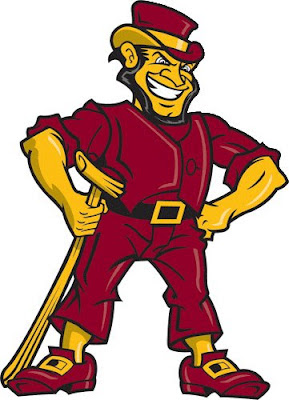Every year my husband thinks I’m going to get into March Madness basketball thingy and whatnot. Every year, I slightly glance at the TV while he is watching if one of my alma matters, UC Berkeley or University of Northern Colorado is in the tournament. I don’t care for sports, mostly because I feel badly for whichever team loses. I imagine the losers going home and crying because it’s their senior year, or the guy who misses the final shot at the buzzer goes down a shame spiral and replays the shot in his mind over and over. I guess it’s a work hazard to have too much empathy for people’s feelings sometimes.
Anyhoo, this year, husband printed up a bracket thingy for me to fill out in an effort to engage me in the tournament. I decided I would make my picks based on which mascot would win in a fight. As a former cheerleader in high school and college, I was subjected to hours of long boring games in between our fabulous performances. I often entertained myself by focusing on the mascots. My favorite mascot moment was in high school, when our Bear did a trampoline jump in order to dunk a basketball and his head flew off. Awesome.
So it appears as if I finally found a way to make March Madness interesting to me! Husband was trying to go to bed last night and I was all, “Honey, do you think a Longhorn or a Gator would win in a fight? Honey? Wake up. A longhorn could stab a gator with his long horns, but gators are sneaky and fast. What do you think?”* Suddenly, I have March Madness! I’m 1 for 2 right now, because I correctly picked that a Cougar would beat a whatever this guy is:

So how do we, as educators, engage kids in a similar way—finding something they are interested in and tapping into it to engage them in something they are not interested in? As school psychologists, we are typically at the front line of working with disengaged students, right? I find that when I have Sulky McGee in my office, I have to find that spark—that connection—on which we can build our rapport. I have to say (reluctantly) that it does help to have some basic sports knowledge sometimes. “How ‘bout those [insert local sports team]?” works with a lot of kiddos.
I also find that once I’ve found a connection with a kiddo, we end up using the topic as a metaphor for their school or social difficulties. With a kid who loved tennis, we discussed what is “in bounds” and what is “out of bounds” when it came to disagreeing with a teacher. With a basketball player, we talked about how you miss 100% of the shots you never take as a lesson on risk taking. And for a kid who liked aggressive video games, we talked about how you “use up your energy” fighting others, and sometimes it’s better to “go around” the guy to get to your goal.
I have seen skilled teachers engage kids in similar ways—they find their “thing” and work it into their lessons. I find that the strategy of “tapping into student’s interests” is one of those things that is easy to say and much harder to do without a lot of planning. Teachers may wonder, “How do I make quadratic equations relevant to a kid who just broke up with her boyfriend? How can a student in crisis possibly personally relate to the plight of the Pilgrams 400 years ago? Can we really make the Canterbury Tales something meaningful for the Facebook generation?” Yes! Yes! Yes! Hey, maybe each kid can make a mock Facebook page for each of the characters in Canterbury Tales and write what they would say, what groups they would join, and who they would be friends with or something. To reach a disengaged student, you often have to get creative.
Hey, if I can get into sports, then anything is possible.
What else have you seen teachers to do incorporate student interests and increase engagement? Have my fellow school psychologists been able to turn a kid’s interest into an analogy about how to deal with challenges? You all know I love me some teachable moments and analogies, so share!
Also, if you must, you can also share who will win March Madness 2012. You can use my mascot decision tree strategy if you want. And good luck deciding if a Bearcat or a Wildcat would win in a fight.
*By the way, by my logic, Florida State Gators are going to win it all. I saw this special on how Alligators have basically been around since the dinosaur age, so they have some mad survival skills. I also remember them saying they can run pretty fast AND climb trees, which is unsettling because I always thought I could run to a nearby tree and climb it if I encountered a hungry gator.

I love this post! A little bit of sports knowledge can go along way, especially with boys (and especially the ones I work with in title I). Love the video game one and the out of bounds.. That can work w basketball too, definitely adding it to my repertoire! One I often use is when discussing anger management skills.. Relating it to athletes and practice (you have to practice when given the opportunity or you can't get good!) basic but they seem to follow it well.
Also, I cringe a little at the end of your post… The university of Florida is my alma mater (double time) and WE are the gators… Florida state is the Seminoles (and our bitter rivals). But I do like the idea of us winning it all!! Haha 🙂
I'm also a Florida alum and love the logic behind your mascot decision tree! You've inspired a new slogan…Florida Gators: You can't even hide in trees.
Thanks for another great post.
For my HS kiddos who have that very apathetic attitude toward school where they don't think school is important – that they won't ever "need" what is being taught – I brought in a copy of my apartment lease (I redacted all of my identifiable info, of course). For the kids who don't think they need reading comprhehension skills, I give it to them to read over – if they can summarize the "high points" I let them go back to class. Amazingly, they realize that maybe reading is important. I also use that for kids who don't believe in math – I have them calculate what the 3% late fee would be if rent is not paid on time, etc. I feel that they need those "real life" examples to see – if they don't know what they are signing, they could be taken advantage of. I also have a chart I break out listing HS dropout vs. HS grad vs. Associate's degree vs. Bachelor's degree salaries across a lifetime. The differences in earnings usually perks kiddos up.
As for March Madness, I'm a UNC-Chapel Hill grad so my Tar Heels are going to take it all the way! What is fairly amusing is that I cannot wear or have any UNC paraphenalia when I'm at my HS since one of the local gangs has Michael Jordan's old UNC jersies (and Carolina hats, colors, etc.) as part of their "gang wear." The first time the police officer asked me to remove my UNC keychain & explain to me that it could symbolize gang affiliation, I could not help but laugh at the image of me being the faculty advisor to this street gang. LOL
@Paige: LOL. I love the new slogan!
My children's phys ed. teacher assigns each student an NFL football team at the beginning of the season, and the kid with the team that wins the SUper Bowl is awarded with a special lunch that the teacher brings in. It's a nice way for the teacher to make a connection with the kids.